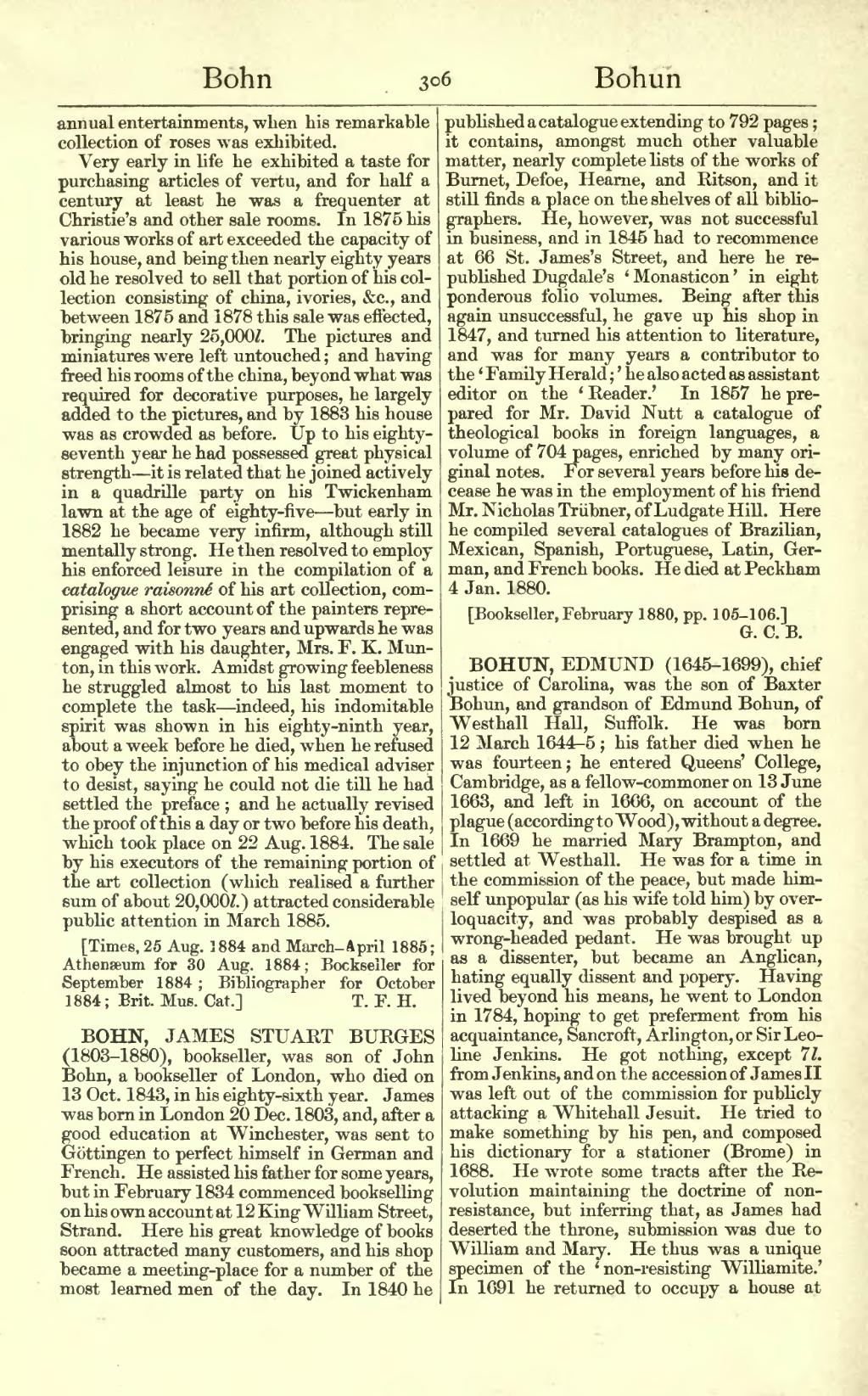annual entertainments, when his remarkable collection of roses was exhibited.
Very early in life he exhibited a taste for purchasing articles of vertu, and for half a century at least he was a frequenter at Christie's and other sale rooms. In 1875 his various works of art exceeded the capacity of his house, and being then nearly eighty years old he resolved to sell that portion of his collection consisting of china, ivories, &c., and between 1875 and 1878 this sale was effected, bringing nearly 25,000l. The pictures and miniatures were left untouched; and having freed his rooms of the china, beyond what was required for decorative purposes, he largely added to the pictures, and by 1883 his house was as crowded as before, up to his eighty-seventh year he had possessed, great physical strength—it is related that he joined actively in a quadrille party on his Twickenham lawn at the age of eighty-five—but early in 1882 he became very infirm, although still mentally strong. He then resolved to employ his enforced leisure in the compilation of a catalogue raisonné of his art collection, comprising a short account of the painters represented, and for two years and upwards he was engaged with his daughter, Mrs. F. K. Munton, in this work. Amidst growing feebleness he struggled almost to his last moment to complete the task—indeed his indomitable spirit was shown in his eighty-ninth year, about a week before he died, when he refused to obey the injunction of his medical adviser to desist, saying he could not die till he had settled the preface; and he actually revised the proof of this a day or two before his death, which took place on 22 Aug. 1884. The sale by his executors of the remaining portion of the art collection (which realised a further sum of about 20,000l.) attracted considerable public attention in March 1885.
[Times, 25 Aug. 1884 and March-April 1885; Athenæum for 30 Aug. 1884; Bookseller for September 1884; Bibliographer for October 1884; Brit. Mus. Cat.]
BOHN, JAMES STUART BURGES (1803–1880), bookseller, was son of John Bohn, a bookseller of London, who died on 13 Oct. 1843, in his eighty-sixth year. James was born in London 20 Dec. 1803, and, after a good education at Winchester, was sent to Göttingen to perfect himself in German and French. He assisted his father for some years, but in February 1834 commenced bookselling on his own account at 12 King William Street, Strand. Here his great knowledge of books soon attracted many customers, and his shop became a meeting-place for a number of the most learned men of the day. In 1840 he published a catalogue extending to 792 pages; it contains, amongst much other valuable matter, nearly complete lists of the works of Burnet, Defoe, Hearne, and Ritson, and it still finds a place on the shelves of all bibliographers. He, however, was not successful in business, and in 1845 had to recommence at 66 St. James's Street, and here he republished Dugdale's ‘Monasticon’ in eight ponderous folio volumes. Being after this again unsuccessful, he gave up his shop in 1847, and turned his attention to literature, and was for many years a contributor to the ‘Family Herald;’ he also acted as assistant editor on the ‘Reader.’ In 1857 he prepared for Mr. David Nutt a catalogue of theological books in foreign languages, a volume of 704 pages, enriched by many original notes. For several years before his decease he was in the employment of his friend Mr. Nicholas Trübner, of Ludgate Hill. Here he compiled several catalogues of Brazilian, Mexican, Spanish, Portuguese, Latin, German, and French books. He died at Peckham 4 Jan. 1880.
[Bookseller, February 1880, pp. 105–106.]
BOHUN, EDMUND (1645–1699), chief justice of Carolina, was the son of Baxter Bohun, and grandson of Edmund Bohun, of Westhall Hall, Suffolk. He was born 12 March 1644-5; his father died when he was fourteen; he entered Queens College, Cambridge, as a fellow commoner on 13 June 1663, and left in 1666, on account of the plague (according to Wood), without a degree. In 1669 he married Mary Brampton, and settled at Westhall. He was for a time in the commission of the peace, but made himself unpopular (as his wife told him) by over loquacity, and was probably despised as a wrong headed pedant. He was brought up as a dissenter, but became an Anglican, hating equally dissent and popery. Having lived beyond his means, he went to London in 1784, hoping to get preferment from his acquaintance, Sancroft, Arlington, or Sir Leoline Jenkins. He got nothing except 7l. from Jenkins and on the accession of James II was left out of the commission for publicly attacking a Whitehall Jesuit. He tried to make something by his pen, and composed his dictionary for a stationer (Brome) in 1688. He wrote some tracts after the Revolution maintaining the doctrine of non-resistance, but inferring that, as James had deserted the throne, submission was due to William and Mary. He thus was a unique specimen of the ‘non-resisting Williamite.’ In 1691 he returned to occupy a house at
